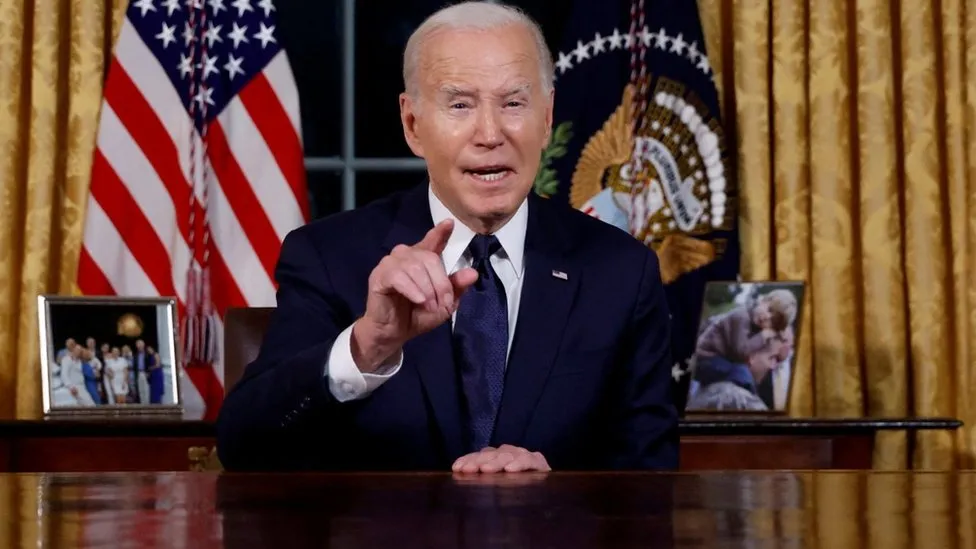President Joe Biden has introduced a new policy aimed at shielding hundreds of thousands of undocumented spouses of US citizens from deportation, according to officials in his administration.
Immigration has emerged as a significant challenge for Mr. Biden in this election year, prompting him to issue a broad executive order aimed at reducing the influx of migrants at the US-Mexico border.
Under the new policy, undocumented spouses who have lived in the US for at least 10 years will be permitted to work legally.
The White House estimates that more than 500,000 spouses will benefit from this initiative.
Addressing a gathering at the White House on Tuesday, President Biden emphasised that this measure aims to make the US immigration system fairer and more just, benefiting immigrants, married couples, and all Americans.
Recent polls indicate that immigration remains a top concern for many voters leading up to the presidential election in November.
The White House also expects the new policy to extend benefits to approximately 50,000 young individuals under the age of 21, whose parents are married to American citizens.
This move represents the most significant relief effort for undocumented migrants already residing in the US since the Obama administration introduced the Deferred Action for Childhood Arrivals (Daca) in 2012.
“The action I’m announcing today will go into effect later this summer,” Mr Biden said at the White House.
“The steps I’m taking today are overwhelmingly supported by the American people, despite what the other team says,” he added, a reference to Republicans.
The White House announcement coincided with the 12th anniversary of Daca, which protected over 530,000 migrants brought to the US as children – known as Dreamers – from deportation.
Senior administration officials stated on Monday that undocumented spouses of US citizens would qualify if they had resided in the country for 10 years and were married as of June 17.
Those eligible will have three years to apply for permanent residency and can obtain a three-year work permit.
On average, the White House estimates that eligible individuals have been in the US for 23 years, with a majority born in Mexico.
They will be granted “parole in place,” allowing them to stay in the US while their status is adjusted.
NumbersUSA, an organisation advocating for stricter immigration controls, criticised the new policy as “unconscionable.”
The organisation’s chief executive, James Massa, said in a statement: “Rather than stopping the worst border crisis in history, President Biden has overreached his executive authority to use an unconstitutional process, circumventing voters and their elected representatives in Congress, to send a message that amnesty is available to those who enter illegally into the United States.”
Alex Cuic, an immigration lawyer and professor at Case Western Reserve University in Ohio, told the BBC that while the action affected a “narrow group”, it marked a “start” for a segment of the US immigrant population that historically would face complications normalising their status in the country, even when eligible.
“A good majority of them [would have] to leave the country in order to come back lawfully,” he said. “It’s like they physically enter the US, but their immigration ‘soul’ doesn’t come with them.”
By permitting beneficiaries to parole in place, Mr. Cuic emphasised that officials are eliminating the necessity to separate families when one spouse must leave the country to apply for lawful permanent residence.
A senior administration official indicated on Monday that the application process is expected to open by the end of the summer.
The White House is also preparing to streamline and expedite the visa process for highly skilled undocumented immigrants who have obtained degrees from US universities or received job offers in their fields, including Dreamers.
Mr. Biden’s announcement follows his recent issuance of a comprehensive executive action allowing US officials to swiftly deport migrants entering the US illegally without processing their asylum claims.
The White House clarified that this action will occur once a daily capacity threshold is reached and the border becomes “overwhelmed.”
Last week, the American Civil Liberties Union (ACLU) sued the Biden administration, arguing that the action violates US immigration law.
During the announcement, Mr. Biden urged those who find the measure “too stringent” to “exercise patience.”
“[In] the weeks ahead, I will speak about how we can make our immigration system more fair and just,” he said.
Aaron Reichlin-Melnick, policy director at the American Immigration Council, said that while the two announcements “don’t intersect with each other at all,” the more recent action may help the administration “get some positive headlines after the pushback” they received over the border announcement.
“The Biden administration has been receiving a lot of flak from people saying that their focus has all been on new arrivals, when there are so many long-term undocumented immigrants stuck trying to navigate our complicated immigration system,” he added.
“I think the actions you’ve seen the president take over the last few weeks really go towards addressing both those concerns,” Mr Reichlin-Melnick added.

